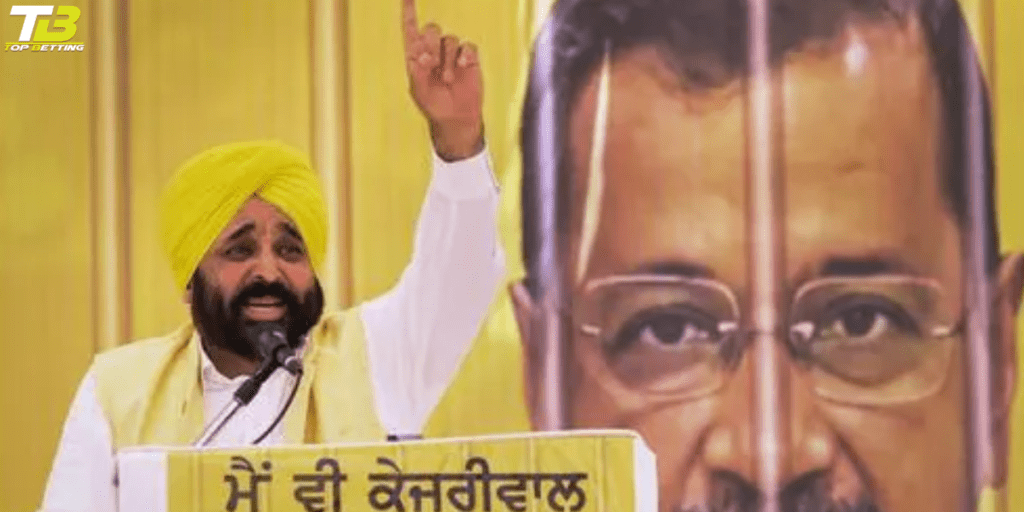
Mann Feels Treated Like Terrorists Meeting Kejriwal in Tihar
In a shocking turn of events, Punjab Chief Minister Bhagwant Mann and AAP MP Sandeep Pathak met Delhi Chief Minister Arvind Kejriwal in Tihar jail, where he is currently imprisoned in connection with alleged irregularities in the now-scrapped Delhi excise policy 2021-22. The meeting, which lasted for around 33 minutes, took place through a ‘mulakat jangla’ inside jail number 2 of the Tihar prison complex in the national capital. However, Mann alleged that the prison authorities treated the meeting as if it was between terrorists, rather than elected heads of two states. This incident has sparked outrage and raised questions about the treatment of political prisoners in India.
The Height of Dictatorship
Mann, addressing the media after the meeting, expressed his shock and disappointment over the way the meeting was organized. He claimed that the prison authorities divided the room with a glass window, creating a sense of separation as if they were not elected heads of states, but terrorists. Mann stated, “This is the height of dictatorship as two chief ministers were introduced as terrorists.” He further criticized the treatment of Arvind Kejriwal, stating that he is not receiving the facilities that are available even to hardcore criminals. Mann questioned the motive behind treating Kejriwal as if he were one of the biggest terrorists in the country.
Lack of Transparency and Fairness
During the media interaction, Mann read a line from the Delhi prison manual, which stated that the jail superintendent can allow well-behaved inmates to have face-to-face meetings with their visitors. He compared Kejriwal’s situation with that of former Finance Minister P. Chidambaram, pointing out that when Chidambaram was in jail, his visitors, including Sonia Gandhi, were allowed to have face-to-face meetings in a room. Mann expressed his disappointment with the unclean glass window that hindered visual contact between Kejriwal and him during the meeting. This lack of transparency and fairness in the treatment of Kejriwal has raised concerns about the motives behind his imprisonment.
Emotional Impact
Mann revealed that the meeting had an emotional impact on him. He spoke passionately about Kejriwal’s commitment to transparency in politics and his efforts to end the politics of the Bharatiya Janata Party (BJP). Mann emphasized that Kejriwal’s treatment reflects the fear and insecurity of the ruling party, as they perceive him as a threat to their political dominance. Despite the emotional turmoil, Mann dismissed speculations of any threats to the Aam Aadmi Party (AAP) and expressed confidence that the party would emerge as a significant political power in the country after the election results are announced on June 4.
Kejriwal’s Directives and Assurances
During the meeting, Kejriwal directed party workers to leave no stone unturned in saving the constitution. He urged Mann to campaign for candidates of the INDI Alliance whenever and wherever required. Kejriwal assured the people of Delhi that he would fulfill all the promises he made before being arrested. Pathak, the AAP MP who was also present at the meeting, mentioned that Kejriwal spoke to them over the phone available in the meeting room. These directives and assurances from Kejriwal highlight his determination to continue his political work even from behind bars.
Meeting Arrangements and Security
According to an anonymous prison official, Mann and Pathak met Kejriwal as common visitors in accordance with the prison manual. Due to space constraints, the two chief ministers met Kejriwal one by one. Elaborate security arrangements were made, taking into account Mann’s Z+ security cover. This level of security measures indicates the significance of the meeting and the attention it has garnered. The meeting between the three politicians has brought the treatment of political prisoners into the spotlight and raised concerns about the fairness of the judicial process.
Arrest as Political Vendetta
The AAP has maintained that Kejriwal’s arrest is nothing but a political vendetta. The party believes that the arrest was orchestrated to crush Kejriwal, who was emerging as a tall opposition leader in the country. The timing of the arrest, just before the general elections, further adds to the suspicion of political motives. The AAP has been vocal about their allegations of the ruling party’s attempts to stifle dissent and suppress opposition voices. Kejriwal’s arrest has become a symbol of the ongoing power struggle in Indian politics.
The Role of AAP
Mann’s assertion that the AAP is a disciplined group and stands together with Kejriwal reflects the unity and determination of the party. Despite the challenges they face, the AAP remains committed to its principles and promises. The party’s confidence in emerging as a significant political force in the country indicates their belief in the power of their ideology and the support they enjoy from the public. The upcoming election results will reveal the extent of the AAP’s impact on Indian politics.

Conclusion
The meeting between Bhagwant Mann, Sandeep Pathak, and Arvind Kejriwal in Tihar jail has brought to light the treatment of political prisoners in India. Mann’s allegations of being treated like terrorists and the lack of transparency and fairness in the meeting arrangements raise concerns about the state of democracy in the country.
Kejriwal’s directives and assurances, despite his imprisonment, demonstrate his unwavering commitment to his political work. The AAP’s resilience and unity indicate their determination to emerge as a significant political power in the country. The outcome of the upcoming elections will shed light on the impact of these events on Indian politics as a whole. It is crucial to ensure that the treatment of political prisoners reflects the principles of democracy and upholds the values of transparency and fairness.











